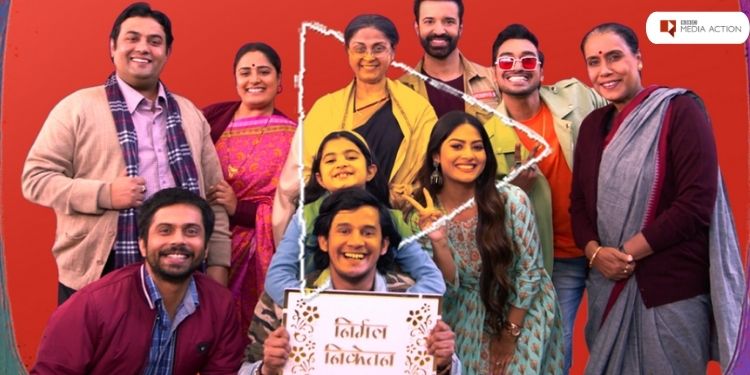Mumbai: BBC Media Action is all set to launch Life Navrangi – a seven-episode web dramedy on faecal sludge management (FSM) on YouTube.
Life Navrangi is the second season in the Navrangi series, a follow up to the successful 26-episode television drama ‘Navrangi Re!’ (Nine to a Shade), that was broadcast by Viacom18 on three of its channels and OTT platforms in 2019. Both series have been supported by the Bill &Melinda Gates Foundation.
According to the World Economic Forum, India’s urban areas produce 120,000 tons of faecal sludge[1](toilet waste generated in on-site sanitation systems) every day. According to estimates about 60 percent of India’s urban population today depend on onsite sanitation systems, which require dedicated planning for FSM– this waste stream, if left untreated can result in serious health risks. India has made considerable progress in building and using toilets. But, according to the Central Pollution Control Board (CPCB) national inventory of Sewage Treatment Plants (STP) published in March 2021, urban India treats only 37 percent of the 72,368 million liters of sewage generated every day, with about two-thirds of the wastewater ending up polluting the environment[2]. Direct disposal of untreated wastewater and faecal sludge into the open, increases the burden of cities to provide drinking water supply to its residents and poses a serious health risk.
Life Navrangi navigates relevant and interesting issues – plans and difficulties about owning one’s dream home, making a mark in one’s profession, dealing with debt and a marriage threatening to fall apart. Its storylines also highlight various facets of FSM such as regular dislodging, need for stopping indiscriminate dumping of untreated fecal sludge that contaminates water, building the right kind of septic tank without cutting corners, and preventing hazardous cleaning.
The series aims to increase civic engagement with respect to FSM, with arcs that build on strong female characters and cross socio-economic and cultural divides. Several characters have varied dilemmas and priorities across the faecal sludge management spectrum, which adds to the twists and turns in the story. Gender norms are a constant subtext, breaking gender stereotypes and examining nontraditional career options for women; the storytelling also addresses the harmful role of mis and disinformation.
Archna Vyas, Deputy Director, Policy Advocacy Communications, and Behavioural Insights, Bill &Melinda Gates Foundation India said, “Faecal Sludge Management and its impact on one’s health and environment features very low in people’s awareness and hence consideration, so there exists limited demand for emptying/dislodging services and limited responsibility to build appropriate containment systems at a household level. Through Life Navrangi, our ultimate goal is to drive action towards safe sanitation behaviors, using the power of storytelling through edutainment, and leveraging the reach and targeting of digital media. At the Gates Foundation, we have been committed to supporting India in its journey towards safe and sustainable sanitation, and we are excited about this partnership with BBC Media Action to shape consumer demand and deliver social impact towards a healthier future”.
Radharani Mitra, Global Creative Advisor, BBC Media Action said, “We realized we needed to capitalize on the power of storytelling to enhance message delivery when it came to FSM. It is a result of our continued effort to make the invisible, visible and increase the risk perception around the issue of faecal sludge management (FSM) and contamination of water.
She added, “The series reflects small town India’s conservative values, dreams of wealth and success – limitations notwithstanding, and a determination to live on their own terms. The plot points in the story are about owning one’s dream home, making a mark in one’s profession, the true meaning of ‘being smart’, dealing with debt and a marriage threatening to fall apart. Our narrative breaks gender stereotypes and includes characters from different socio-economic and cultural backgrounds. Correct FSM services become a metaphor for a more organised way of living, managing resources and relationships, and achieving one’s goals.”
Professor Srinivas Chary, Prof and Director, Urban Governance and Environment, Admin Staff College of India (ASCI) CEO, Wash Innovation Hub (WIH), asserted that, “FSM is not only an infrastructural issue but also a socio-cultural issue. It is critical to acknowledge the need for FSM because it has a considerable impact on public health, climate, and environmental pollution. Navrangi Re! opened our eyes to the role of media and storytelling in combatting this public health crisis and we welcome this second series with new and exciting storylines.”
Produced by Bodhi Tree Multimedia for YouTube, the show touches upon many aspects of FSM, all hidden in plain sight and packed between stories about real characters with real aspirations and anxieties. It airs on YouTube, every Thursday, starting 19th May 2022.

















